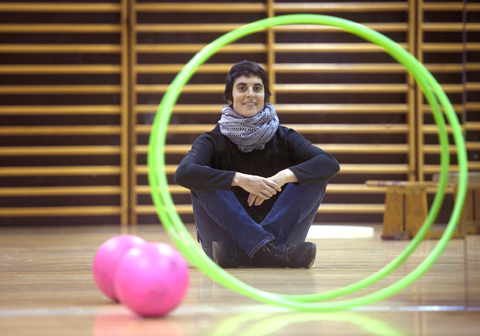A researcher at the UPV/EHU's Faculty of Education and Sports has confirmed that physical activity offers immediate improvements for chronically ill patients, who have signed up to a physical exercise programme. To do this, she conducted a retrospective analysis of the therapeutic exercise programme run by Dr Zunzunegui between 2000 and 2012 at the Mendizorroza Centre for Sports Medicine; the programme was designed to improve symptoms in various chronic diseases and reduce risk factors, in addition to reporting on how physical activity benefits diseases in groups with chronic disorders.
A 12-year study confirms the importance of physical activity in chronic patients
A piece of research by the UPV/EHU-University of the Basque Country has analysed the data obtained in a therapeutic exercise programme run in Vitoria-Gasteiz between 2000-2012
- Research
First publication date: 04/01/2017

The researcher Irantzu Ibañez based her research on the work conducted by the late Dr Zunzunegui at the Mendizorroza Centre for Sports Medicine in Vitoria-Gasteiz during the period between 2000 and 2012. The main aim of Ibáñez's study was to collate the data that Dr Zunzunegui and his team gathered over these years and assess the programme to see whether it was effective or not.
The main aims of the therapeutic exercise programme set up by Dr Zunzunegi were to improve symptoms in a range of chronic diseases, such as disorders of the musculoskeletal system, type 2 diabetes, hypertension and obesity, prevent degenerative diseases, lower risk factors, improve health and life quality, and encourage a healthy, active life. The programme lasted nine months and involved one hour-long session combining aerobic, strength and flexibility exercises carried out three times a week. The variables analysed in the study were as follows: height, weight, waist circumference, hip circumference, flexibility of extensor muscles of the trunk, blood pressure, heart rhythm and cardiorespiratory capacity. The participants also filled in some questionnaires to assess their motivation and satisfaction at the end of the programme.
Improvement in blood pressure, motivation and satisfaction
Measurements of post-exercise blood pressure confirmed slightly lower levels in comparison with the resting measurements taken, which shows that physical activity has immediate blood pressure lowering effects and stresses the beneficial effects of short periods of exercise.
Minimal effects were observed in all the variables relating to body composition, possibly due to a stimulus of insufficient exercise, low compliance with the programme, lack of diet control, an increase in lean body mass, etc. Yet it should be stressed that the reductions in blood pressure occurred irrespective of the changes in body composition, which underlines the importance of physical activity even though weight may not be reduced. Once the nine months that the programme lasted were over, a lowering of 5 mmHg in blood pressure was observed, which confirms the positive impact of physical activity on reducing cardiovascular risk and mortality. "Prestigious pieces of research confirm that this is a highly significant reduction when it comes to lowering various risk factors, above all in people who are hypertensive and have other diseases," explained Irantzu Ibañez.
They also detected changes in cardiorespiratory capacity, but they were modest, "although they could be significant in certain individuals affected by serious diseases," she explained. Three months into the programme they noticed improvements in flexibility; "this is a significant change and an important contribution towards improving functionality," said the researcher.
"The main aim of the programme was to get people to do physical exercise and to learn and understand that physical exercise is a very valuable tool enabling them to control their diseases," explained Ibañez. So within the framework of the programme various informative seminars were run in connection with physical activity, diet, etc. in order to inform the participants. The participants likewise "said they had been very happy with the programmes," she added, "and that the symptoms of their diseases and life quality had improved".
"It is clear that prevention is the way," concluded the researcher, "and that society has to understand that prevention is better than cure and that it is much cheaper. It has been amply demonstrated that in the long term preventive programmes are much more effective and more cost-effective than treatment. So it is essential to activate programmes like this one that Dr Zunzunegi set up and which was discontinued at the time."
Additional information
Irantzu Ibañez-Lasurtegi (Vitoria-Gasteiz, 1981) is a graduate in Physical Activity and Sports Sciences. She wrote up her thesis (Effect of an exercise programme on the physical condition of individuals with chronic disorders) at the UPV/EHU's Department of Physical Activity and Sports Sciences under the supervision of Susana Gil-Orozko of the UPV/EHU's Faculty of Medicine and Odontology.
Photos: Nuria González. UPV/EHU.





